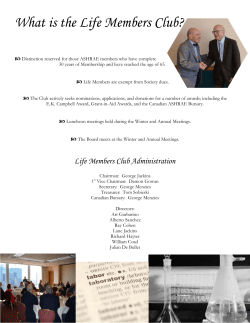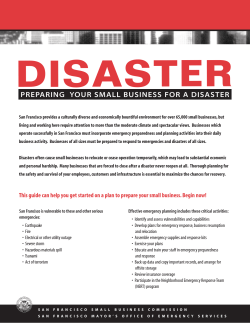
WHAT IS A COAD? A Community Organization Active in Disaster (COAD) is
WHAT IS A COAD? A Community Organization Active in Disaster (COAD) is an umbrella organization that exists to bring together stakeholders interested in building better prepared and more resilient communities. COAD is a local extension of the statewide New Hampshire Volunteer Organizations Active in Disaster (VOAD). COADs do not provide direct services, but provide a network through which individual organizations can more effectively address their mission and service goals during all four phases of disaster. COAD members maintain their autonomy while working to reduce duplication of services and other inefficiencies that occur during times of disaster. For more information and tools for starting a COAD in your community, contact the NH VOAD through Volunteer NH! 603-271-7200 Volunteer NH! 117 Pleasant St. Dolloff Bldg. Concord, NH 03301 COAD is a local extension of the statewide New Hampshire Volunteer Organizations Active in Disaster (VOAD). WHO is in a COAD? BENEFITS OF COAD COAD AT WORK IN NH COAD brings together organizations from all sectors of a community: When a COAD is organized effectively, both member organizations and the community at large reap the benefits. These benefits include: • Empowered communities • Expedited local response • Improved management of volunteers and donations • Promotion of emergency education and preparedness • A voice for concerned individuals in the community • Resources for facilitating long-term recovery • Reducing service duplication • Linkage with NH VOAD • Transparency of partner agencies • Ability to work productively with Emergency Management • Resources for Emergency Managers To promote their effectiveness in all phases of disaster, communities have begun to recognize the importance of organizing prior to an event. Several New Hampshire communities have used recent disasters to springboard the development of their COADs. Non-profit Agencies Local Businesses Faith Based Organizations Schools Local Government FOUR PHASES OF DISASTER A COAD plays a role in all phases of disaster: MITIGATION – pre-emptive activities aimed at reducing the physical effects of disaster Addressing hazard risk PREPARDNESS – advance activities which improve personal and community disaster readiness Organizing and educating volunteers RESPONSE – actions taken as the disaster occurs Providing support and services to directly impacted areas RECOVERY – activities aimed at returning the community to its pre-disaster condition Advocating for disaster victims GREATER MANCHESTER COAD Following a devastating house fire in January 2008, a consortium of local organizations worked together to help 28 displaced victims. The effectiveness of this collaboration promoted the streamlined and immediate delivery of services to meet these families most basic needs. The Greater Manchester COAD, lead by the greater Manchester Red Cross, used this event to highlight the need for effective collaboration. The COAD was able to formally organize itself and increase its membership, thus ensuring that Manchester is better prepared for disasters. MONADNOCK REGION COAD In the fall of 2005 the Monadnock region was devastated by intense flooding. This disaster unified the efforts of a variety of community stakeholders. Through their coordinated approach to response and recovery, the region was able to prove their resiliency. The effectiveness of this collaboration prompted this group to remain organized to better prepare for the next disaster. This COAD now has a vested interest in all four phases of a disaster, making the region more resistant to future disasters.
© Copyright 2025










